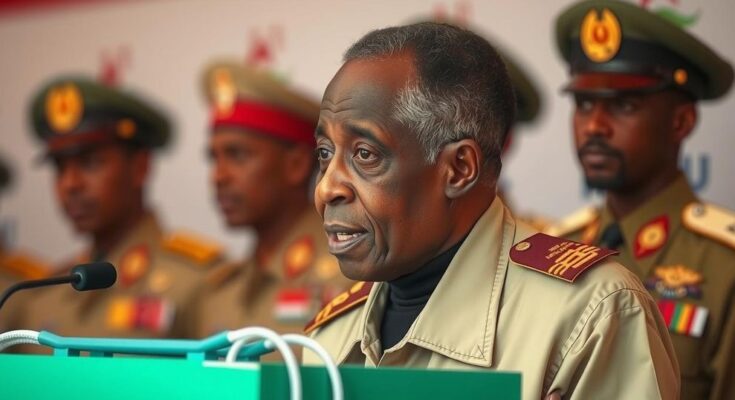Chad held a general election intended to end military rule after three years; however, low voter turnout was expected following a boycott by opposition parties. Initial reports suggested only 38 percent of voters participated. The atmosphere is tense, with allegations of election fraud and a historically contentious political climate dominating the electoral landscape.
On Sunday, Chad conducted a general election, viewed by the government as a crucial step toward ending three years of military rule. However, low voter turnout was anticipated following a boycott call by opposition parties. Initial reports from the elections management agency indicated a turnout of merely 38 percent to elect a new parliament, local assemblies, and councils. Election officials ascribed this apathy to cold weather, despite opposition leaders asserting that the election results were predetermined.
Success Masra, leader of the opposition Transformers party, stated, “They have all stayed at home following our call, that is, the overwhelming majority.” This widespread abstention effectively favors candidates supportive of President Mahamat Idriss Deby Itno, who assumed power in 2021 following a military coup and later faced accusations of election fraud during a presidential poll in May.
President Deby encouraged citizens to participate in the elections, declaring it a “historic day,” and shared images of himself voting on social media. In stark contrast, Masra alleged that the outcome had already been manipulated, asserting, “The fabricated results are already in the computers.” Perspectives among the populace varied, with some citizens expressing skepticism about the electoral process entirely.
Significant participation was reported among soldiers and nomads, who voted a day earlier for logistical purposes. Chad’s election management boasted a remarkable 72 percent turnout in military polls and 54 percent among nomadic voters. Local issues were forefront, with nomadic community representatives voicing concerns over climate change’s detrimental impact on their livelihoods.
The electoral process is being closely observed by foreign monitors and political party representatives. Allegations surfaced regarding ballot irregularities, with the opposition accusing the ruling party of facilitating a fraud network. This election occurs amid ongoing security threats from Boko Haram and complicating geopolitical situations involving France and Sudan.
The government regards these elections as a pivotal juncture in its transition to democracy, following the death of former President Idriss Deby, who had ruled Chad for three decades. However, the entrenched skepticism from opposition factions reveals significant challenges ahead for Chad’s democratic aspirations.
Chad has experienced a tumultuous political landscape, particularly after the recent military coup in 2021, which resulted in President Mahamat Idriss Deby taking power following the death of his father, long-time ruler Idriss Deby. The current elections are framed as essential for restoring democratic governance after a prolonged period of military control. However, the legitimacy of these elections is contested, with significant opposition calling into question the fairness and transparency of the electoral process. The economic struggles and security challenges further complicate the political climate as Chad seeks to navigate these changes and achieve stability.
In conclusion, Chad’s recent general election highlighted the complexities of transitioning from military rule to democracy. Low voter turnout, influenced substantially by opposition-led boycotts, reflects widespread public disillusionment. Moreover, the accusations of pre-determined results ascertain the challenges faced by the current government in asserting its legitimacy. As Chad grapples with economic hardships and security threats, the path toward genuine democratic governance remains fraught with obstacles.
Original Source: www.rfi.fr




